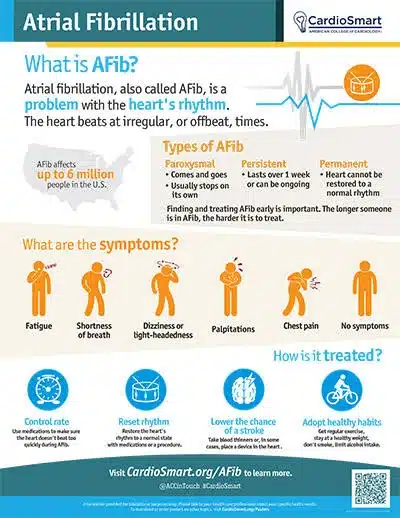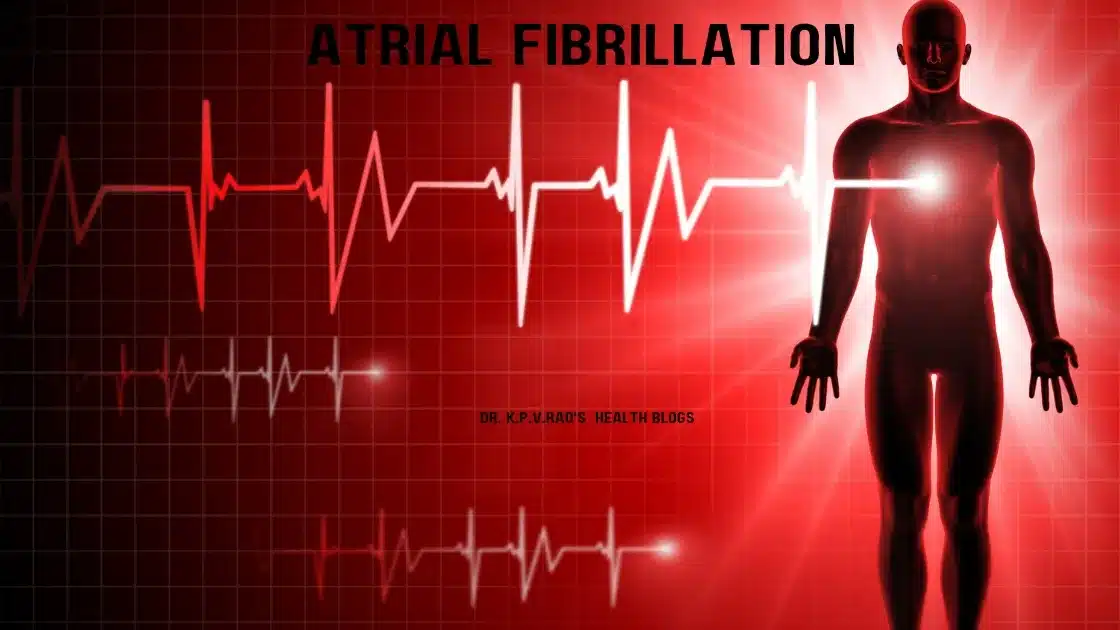Have you ever sometimes felt like your heart is ‘fluttering’ or like it is on a roller-coaster ride?
If no, then it is fine, but if yes, you may be having irregular heartbeats- a condition called atrial fibrillation [or AFib, as doctors generally call it].
So, what exactly is this “atrial fibrillation” or “AFib” and what causes it?
In this article we will learn all about this condition that can land you in hospital if not attended to promptly. We will learn only about what causes it and what one can do to prevent it; we will skip the treatment part, as it is for your doctor or cardiologist to decide.
What is atrial fibrillation?
Before we delve into this topic, let me remind you that atria are the two smaller and upper chambers in our heart.
AFib is a disturbance in the rhythm of the heartbeats of atria, a condition characterized by irregular and rapid heartbeats.
It disrupts the normal rhythm of the heart, causing it to quiver or tremble instead of beating steadily.
It is often compared to a malfunctioning orchestra, where the strings section becomes uncoordinated and produces a chaotic sound instead of playing in harmony.
AFib can lead to various symptoms, including palpitations, shortness of breath, and fatigue. It may increase the risk of complications such as blood clots, stroke, and heart failure.
How does AFib affect you?
Atrial fibrillation affects the functioning of the heart by:
- Decreasing the heart’s ability to pump blood efficiently.
- Increasing the risk of blood clots forming in the atria.
- Potentially leading to complications such as stroke, heart failure, or other heart-related issues.
What are the common symptoms of Afib?
Symptoms can include
- palpitations- a feeling of fast, pounding heart beating
- shortness of breath- a feeling of breathlessness
- dizziness- feeling giddy
- fatigue- feeling of extreme tiredness
- chest discomfort- a feeling of heaviness in the chest similar to that in a heart attack.

Overall, atrial fibrillation disrupts the normal electrical signals in the heart, affecting its rhythm and potentially compromising its ability to pump blood effectively.
8 common conditions that increase the risk for developing atrial fibrillation
Let’s now study one by one the 8 common conditions that can cause atrial fibrillation.
1. Hypertension
Hypertension increases the risk by causing structural changes in the heart and disrupting its electrical system. The high blood pressure puts a strain on the walls of the blood vessels and the heart muscle itself.
Over time, this can lead to hypertrophy (thickening) of the heart’s walls and enlargement of the chambers.
These structural changes can alter the normal electrical conduction in the heart, making it more susceptible to arrhythmias like atrial fibrillation.
Additionally, hypertension can promote the development of other risk factors such as coronary artery disease, heart failure, which further increase the likelihood of atrial fibrillation.
2. Coronary artery disease
Coronary arteries are the lifeline of the heart. They supply blood to the heart muscles, keeping it ticking [beating].
Coronary arteries are said to be diseased when they get narrowed due to cholesterol getting deposited in their walls causing blockages. These blockages cut off the blood supply to heart muscles thereby impairing the electrical functioning of heart muscles that keeps the heart ticking [beating].
To understand how coronary heart disease causes AFib and vice versa, you can read this short article-
Atrial Fibrillation DOC by K P Vasudeva Rao3. Heart failure
Heart failure increases the risk by causing changes in the structure and function of the heart. The impaired pumping ability of the heart in heart failure can lead to the enlargement of the atria, which are the upper chambers of the heart.
Enlarged atria are like a faulty electrical circuit, causing irregular heart rhythms such as atrial fibrillation. Heart failure also acts as a disruption to the heart’s electrical system, increasing the risk of atrial fibrillation.
4. Valvular heart disease
Valvular heart disease such as mitral stenosis, aortic stenosis, etc., increases the risk of this arrhythmia by causing changes in the structure and function of the heart valves. These changes can lead to abnormal blood flow patterns within the heart, which in turn can disrupt the electrical signals responsible for maintaining a regular heartbeat.
5. Congenital heart disease
Congenital heart disease increases the risk of AFib due to the structural abnormalities in the heart that disrupt the normal electrical pathway. These abnormalities can create irregularities in the heart’s rhythm, leading to the development of atrial fibrillation.
The presence of congenital heart conditions like atrial septal defect (ASD), ventricular septal defect (VSD), and tetralogy of Fallot can increase the likelihood of atrial fibrillation (AFib) development.
6. Obesity
Obesity increases the risk of AFib due to various factors such as inflammation, structural changes in the heart, and metabolic disturbances.
Obesity, causing heart inflammation, is like a ticking time bomb inside the body, with various factors acting as triggers. The bomb is made up of pro-inflammatory substances (produced by fatty cells), oxidative stress, and an activated immune system.
This ongoing inflammation slowly damages the heart, arteries, and blood vessels, making cardiovascular diseases like heart attacks and strokes more likely to occur.
Additionally, obesity increases the risk of atrial fibrillation by putting strain on the heart (the workload of heart increases with every extra pound or kilo you put on to your bodyweight) and disrupting the normal electrical signals that regulate its rhythm.
7. Sleep apnea
Sleep apnea is a sleep disorder characterized by interrupted breathing during sleep. It can cause atrial fibrillation, due to the intermittent drop in oxygen levels and the subsequent stress on the heart.
8. Diabetes.
Diabetes can cause AFib by increasing the risk of cardiovascular diseases, such as coronary artery disease and hypertension.
The chronic high blood sugar levels associated with diabetes can damage the blood vessels and lead to the development of atherosclerosis (hardening and narrowing of the arteries), which can disrupt blood flow to the heart.
This can result in the formation of blood clots, which may travel to the atria (upper chambers of the heart) and trigger atrial fibrillation. Additionally, diabetes can also lead to autonomic dysfunction and inflammation, both of which can contribute to the development and progression of atrial fibrillation.
Complication of AFib
Interestingly, some of the complications of AFib can be the same as the risk factors that causes it. Complications of atrial fibrillation include stroke, heart failure, and other heart-related conditions.
Regular medical check-ups and adherence to your healthcare provider’s recommendations can prevent these conditions.
FAQ
How long can a person live with atrial fibrillation?
The life expectancy of a person with atrial fibrillation can vary. It depends whether the patient has other underlying conditions such as hypertension, diabetes, etc., that can worsen Afib or pose a challenge to the treatment.
Can atrial fibrillation go away?
Yes, atrial fibrillation can go away if detected early and immediate medical treatment is given.
Can atrial fibrillation be caused by anxiety?
Yes, anxiety can be a cause of atrial fibrillation in some individuals who are sensitive and stressed out.
What not to do when you have atrial fibrillation?
Follow your doctor’s instructions and avoid the following when you have atrial fibrillation:
1. Ignoring symptoms or neglecting regular check-ups.
2. Not taking prescribed medications or stopping them without consulting your doctor.
3. Consuming excessive amounts of alcohol or caffeine.
Smoking or using tobacco products.
4. Ignoring high blood pressure or not managing it properly.
5. Engaging in excessive physical exertion or intense activities without medical guidance.
6. Self-medicating or using over-the-counter medications without medical advice.
Remember, always consult your healthcare provider for personalized advice regarding your specific condition.
Conclusion
Atrial fibrillation is a serious condition that requires attention. By understanding its causes, symptoms, and treatment options, individuals can take proactive steps in managing their health. Regular consultation with a healthcare professional is crucial for accurate diagnosis and personalized care.
I am sure that with proper knowledge and care, anyone can navigate their life with atrial fibrillation effectively.

